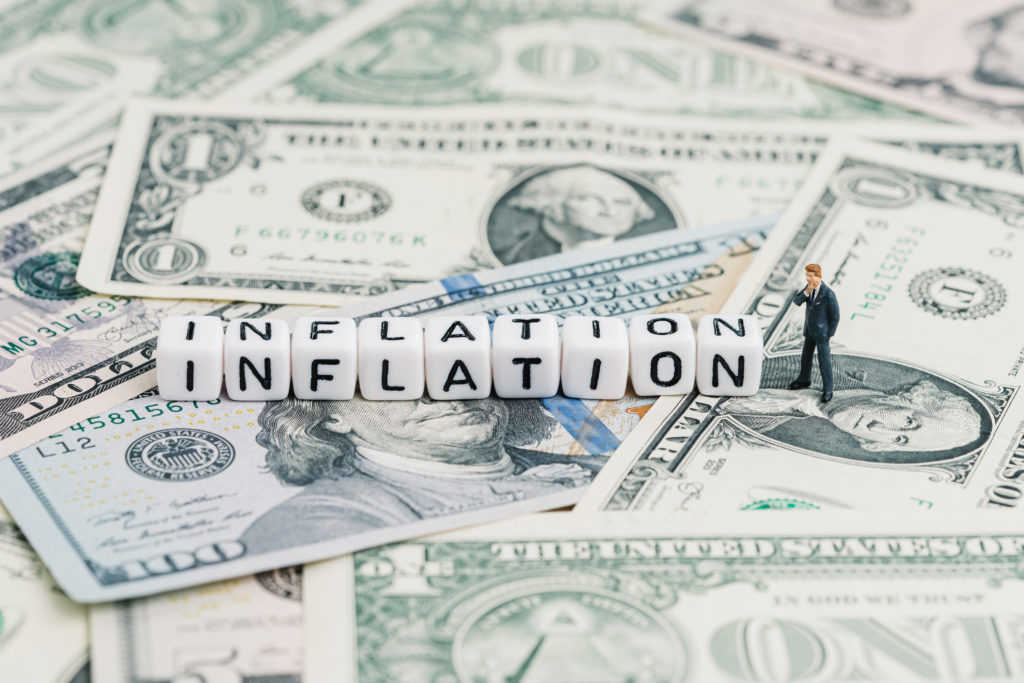The subject of inflation has dominated the recent economic news. After a decade of low inflation rates averaging around 2%, the core inflation rate has soared in recent months. Inflation jumped from 2.6% in March to 4.2% in April, 5.0% in May, and 5.4% in June — these were the biggest increases in inflation in 13 years.
Some economists have attributed these hikes to the economy’s reopening after last year’s COVID-19 lockdowns. The massive amounts of economic stimulus the government has poured into the economy to combat last year’s pandemic recession have also contributed. Federal Reserve Chairman Jerome Powell has stated that he believes these spikes are temporary and that inflation will fall once the economy returns to normal.
No one knows for sure exactly what’s going to happen with inflation (or any other economic indicator) in the future. But these drastic inflation spikes make now an excellent time to consider the impact of inflation on a retirement portfolio.
Inflation = Rising Prices
Inflation is an increase in the price you pay for the goods and services you buy. Over time, of course, the prices of most things rise, with personal technology being a notable exception (think smartphones and big-screen TVs). The question is: How much and how fast are prices rising?
As noted above, inflation has stayed relatively low for at least the past decade. The last time inflation topped 5.4% was in the summer of 2008. But people of a certain age remember the infamous double-digit inflation and interest rates of the 1970s and early 1980s, with inflation hitting nearly 15% in early 1980. Imagine trying to buy a home with a double-digit mortgage interest rate!
Over the long term, inflation reduces the purchasing power of your money. One dollar 10 years from now will buy less than one dollar today, assuming that inflation continues in some amount and deflation doesn’t occur (that’s a topic for another article). This is why it’s critical to consider the impact of inflation on your long-term savings and your ability to live comfortably in retirement.
For example, let’s consider a retirement account that was worth $100,000 in 2010. Assuming no additional contributions and an average annual return of 6%, the account would have risen in value to $179,084 by 2020. But when we factor 3% annual inflation into the equation, the real value of the account falls by more than $45,000 to $133,255. And this is factoring in a relatively low inflation rate.
If you have a pension plan, keep in mind that inflation will reduce the value of your future pension payments unless your plan has cost-of-living adjustments (COLAs). But with the exception of government and teacher’s plans, few pensions feature COLAs — and even those that do usually lag the actual inflation rate by a bit.
Our Inflation Assumptions
Here at Minerva Planning Group, we assume an annual inflation rate of just under 4% when creating retirement plans for our clients, based on the long-term average rate over the past 40 years. We assume a higher inflation rate for healthcare and college expenses since these costs typically rise more than other goods and services.
Our assumption has been much higher (nearly double) than the actual inflation rate for the last number of years. This has served as a tailwind for our clients, who have benefitted by enjoying more purchasing power with their retirement dollars. If current inflation trends continue, however, our assumed inflation rate may be just slightly higher than the actual rate this year, reducing the effects of this tailwind.
The government’s official inflation rate is based on the Consumer Price Index (CPI), a weighted average of the prices of a basket of consumer goods and services like transportation, food, and healthcare. The rate of inflation experienced by each individual and family will be different from this based on which goods and services they purchase.
Residential rents, for example, are soaring in many areas of the country. So if you’re a renter, you will probably face higher inflation than a homeowner with a fixed-rate mortgage, all else being equal.
Inflation and the Stock Market
Finally, you may be wondering what the impact of inflation might be on the stock market, which continues to set record highs on a weekly basis. Historically speaking, after an initial period of adjustment, stocks tend to exceed inflation. However, this short-term “adjustment” period can be painful — so if the current bout of inflation does persist, it wouldn’t be surprising to see stocks surrender some of their gains.
Don’t hesitate to give us a call if you have more questions about the impact of inflation on your retirement plan. We can discuss strategies to minimize this impact and protect the value of your retirement savings.



